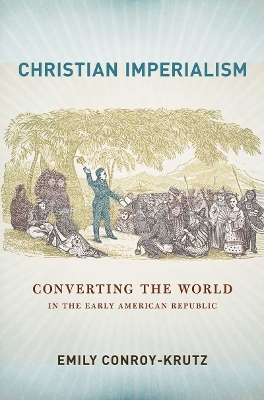
Christian Imperialism
Converting the World in the Early American Republic
Seiten
2015
Cornell University Press (Verlag)
978-0-8014-5353-3 (ISBN)
Cornell University Press (Verlag)
978-0-8014-5353-3 (ISBN)
In 1812, eight American missionaries, under the direction of the recently formed American Board of Commissioners for Foreign Missions, sailed from the United States to South Asia. The plans that motivated their voyage were ano less grand than taking part in the Protestant conversion of the entire world. Over the next several decades, these men...
In 1812, eight American missionaries, under the direction of the recently formed American Board of Commissioners for Foreign Missions, sailed from the United States to South Asia. The plans that motivated their voyage were ano less grand than taking part in the Protestant conversion of the entire world. Over the next several decades, these men and women were joined by hundreds more American missionaries at stations all over the globe. Emily Conroy-Krutz shows the surprising extent of the early missionary impulse and demonstrates that American evangelical Protestants of the early nineteenth century were motivated by Christian imperialism—an understanding of international relations that asserted the duty of supposedly Christian nations, such as the United States and Britain, to use their colonial and commercial power to spread Christianity.
In describing how American missionaries interacted with a range of foreign locations (including India, Liberia, the Middle East, the Pacific Islands, North America, and Singapore) and imperial contexts, Christian Imperialism provides a new perspective on how Americans thought of their country’s role in the world. While in the early republican period many were engaged in territorial expansion in the west, missionary supporters looked east and across the seas toward Africa, Asia, and the Pacific. Conroy-Krutz’s history of the mission movement reveals that strong Anglo-American and global connections persisted through the early republic. Considering Britain and its empire to be models for their work, the missionaries of the American Board attempted to convert the globe into the image of Anglo-American civilization.
In 1812, eight American missionaries, under the direction of the recently formed American Board of Commissioners for Foreign Missions, sailed from the United States to South Asia. The plans that motivated their voyage were ano less grand than taking part in the Protestant conversion of the entire world. Over the next several decades, these men and women were joined by hundreds more American missionaries at stations all over the globe. Emily Conroy-Krutz shows the surprising extent of the early missionary impulse and demonstrates that American evangelical Protestants of the early nineteenth century were motivated by Christian imperialism—an understanding of international relations that asserted the duty of supposedly Christian nations, such as the United States and Britain, to use their colonial and commercial power to spread Christianity.
In describing how American missionaries interacted with a range of foreign locations (including India, Liberia, the Middle East, the Pacific Islands, North America, and Singapore) and imperial contexts, Christian Imperialism provides a new perspective on how Americans thought of their country’s role in the world. While in the early republican period many were engaged in territorial expansion in the west, missionary supporters looked east and across the seas toward Africa, Asia, and the Pacific. Conroy-Krutz’s history of the mission movement reveals that strong Anglo-American and global connections persisted through the early republic. Considering Britain and its empire to be models for their work, the missionaries of the American Board attempted to convert the globe into the image of Anglo-American civilization.
Emily Conroy-Krutz is an Associate Professor in the Department of History at Michigan State University. She is the author of Missionary Diplomacy.
Prologue: An American Missionary in London
Introduction: Christian Imperialism and American Foreign Missions
1. Hierarchies of Heathenism
2. Missions on the British Model
3. Mission Schools and the Meaning of Conversion
4. Missions as Settler Colonies
5. American Politics and the Cherokee Mission
6. Missionaries and Colonies
7. A "Christian Colony" in Singapore
Conclusion: Missions and American Imperialism
Notes
Index
| Erscheint lt. Verlag | 18.11.2015 |
|---|---|
| Reihe/Serie | The United States in the World |
| Zusatzinfo | 5 Halftones, black and white |
| Verlagsort | Ithaca |
| Sprache | englisch |
| Maße | 152 x 229 mm |
| Gewicht | 454 g |
| Themenwelt | Geschichte ► Allgemeine Geschichte ► Neuzeit (bis 1918) |
| Geisteswissenschaften ► Geschichte ► Regional- / Ländergeschichte | |
| Geschichte ► Teilgebiete der Geschichte ► Religionsgeschichte | |
| Religion / Theologie ► Christentum ► Kirchengeschichte | |
| Sozialwissenschaften ► Politik / Verwaltung ► Europäische / Internationale Politik | |
| ISBN-10 | 0-8014-5353-4 / 0801453534 |
| ISBN-13 | 978-0-8014-5353-3 / 9780801453533 |
| Zustand | Neuware |
| Haben Sie eine Frage zum Produkt? |
Mehr entdecken
aus dem Bereich
aus dem Bereich
Europa 1848/49 und der Kampf für eine neue Welt
Buch | Hardcover (2023)
DVA (Verlag)
48,00 €
Giordano Bruno - ein ketzerisches Leben
Buch | Hardcover (2024)
C.H.Beck (Verlag)
29,90 €


